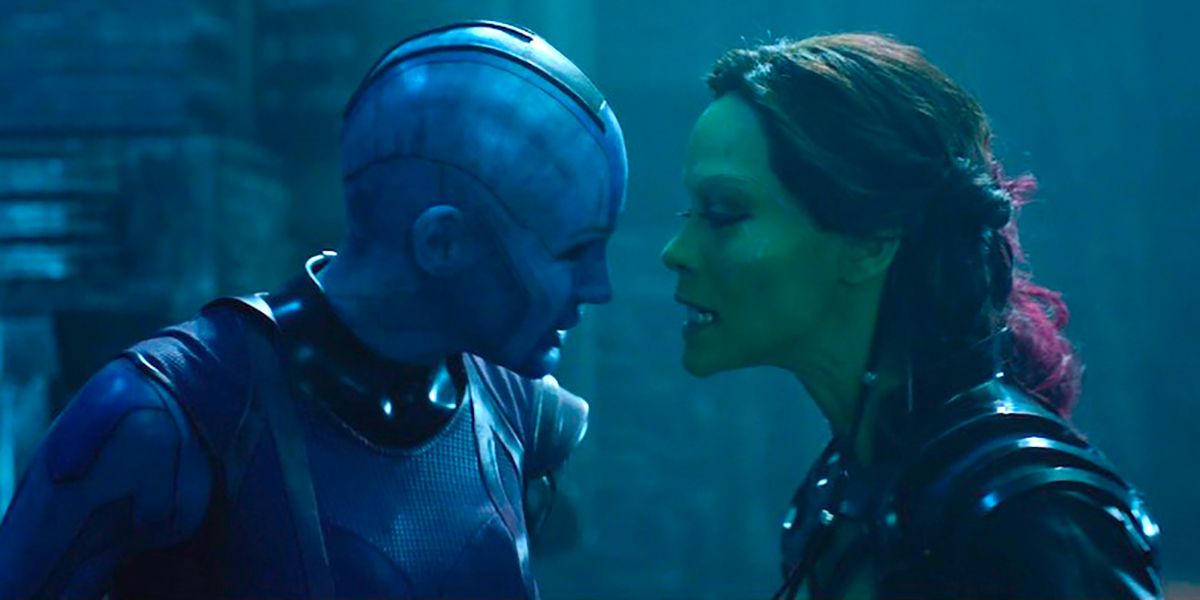WARNING: The following contains spoilers for Marvel's Black Widow, now playing in theaters and on Disney+ Premier Access.
Sibling relationships in the Marvel Cinematic Universe have been a fertile breeding ground for dramatic storytelling, with the most famous -- that of Thor and Loki -- having enough potential to be at the center of over a decade's worth of films and television. Black Widow continues that tradition with the relationship between Natasha and Yelena, which actually ends up quietly serving as a parallel and continuation of the sisterly drama present between Nebula and Gamora.
Natasha and Yelena are portrayed as estranged sisters in Black Widow, spending parts of their childhood together undercover with their "parents," fellow Russian agents Alexei and Melina. Eventually, Natasha was able to escape the control of the Red Room and defect to S.H.I.E.L.D, but on top of breaking away from her old life, Natasha effectively abandoned any chance of finding Yelena. The lingering resentment Yelena feels toward Natasha during the early parts of Black Widow largely stem from the Avenger abandoning her to the whims of the Red Room. Even if Natasha convinces herself they weren't family, Yelena never believed that.
It's not the first time the MCU has taken the time to examine a difficult relationship between sisters. The relationship between Gamora and Nebula from Guardians of the Galaxy actually parallels the one shared between the Black Widows in a number ways, from their forced adoption by a nefarious figure, to how they were all trained to be killers, to the abuse both sets faced over the years. Also, both pairs of sisters have, by the time they're introduced, largely fallen apart, with Natasha and Yelena coming to blows in their first in-person encounter in years, while Nebula repeatedly tries to murder Gamora after she goes rogue.
Plus, both relationships get the chance to reflect on what has happened to them. Although they were taken in by villains (Thanos and the Red Room), the choice to repair that sisterly relationship falls on the women as they escape their grasp. Notably, for Nebula and Yelena, a great deal of their hurt stems from how their "perfect" older sisters didn't recognize the pain they were forced through. Both were in need of an actual family, only to be more or less ignored by their older sisters. However, Natasha and Gamora make amends with their sisters after choosing to do so and owning up to their faults.
It's an important benchmark for all four women, giving them emotional growth in a franchise that highly values spectacle. By making peace with their family unit and admitting that it's okay for them to have seen themselves as each other's loved ones, Natasha and Yelena get to achieve a level of peace that not even Gamora and Nebula found -- with their own attempts to repair their relationship upended by Gamora's death at the hand of Thanos in Avengers: Infinity War.
However, Nebula proved how important this growth for her was in Avengers: Endgame, and Yelena might get the same chance in future MCU properties. These arcs quietly and thematically tie the radically different Black Widow and Guardians of the Galaxy together in a mature way, and it's a welcomed storyline to the MCU.
Directed by Cate Shortland, Black Widow stars Scarlett Johansson as Natasha Romanoff/Black Widow, Florence Pugh as Yelena Belova, David Harbour as Alexei Shostakov/Red Guardian, O-T Fagbenle as Mason and Rachel Weisz as Melina Vostokoff, with William Hurt as Secretary of State Thaddeus Ross and Ray Winstone as General Dreykov. The film is playing in theaters and on Disney+ Premier Access.
KEEP READING: CBR's Black Widow Guide: News, Easter Eggs, Reviews, Recaps, Theories and Rumors


